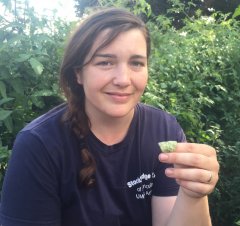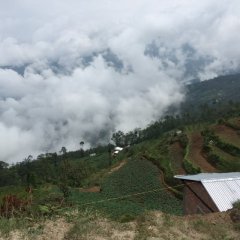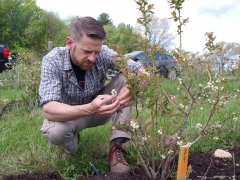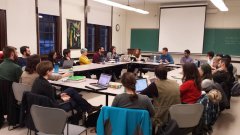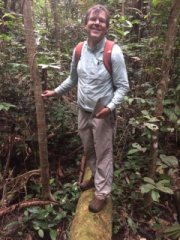News Highlights
MCB students awarded NIH funded two-year traineeships through the UMass Biotech Training Program
MCB students awarded NIH funded two-year traineeships through the UMass Biotech Training Program
Graduate students in the MCB Program, Margaux Audett (Maresca Lab) and Heather Sherman (Osborne and Minter Labs), have been awarded 2016 traineeships through the BTP Program. The 2-year NIH funded Traineeships allow the students to continue current research in their home labs, and also offer opportunities to make connections and network with others in the biotech industry through career events, seminars and an annual symposium. Laboratory modules, originally established through the Institute for Cellular Engineering, have been continued through the Biotech Training Program, giving students hands-on experience with cutting edge techniques, and industrial internships for students in BTP are available. Current internships are through Vertex Pharmaceuticals, Sanofi (Genzyme) and the Material and Analytical Sciences team at Boehringer Ingelheim. Read More
PB MS student Kelly Allen receives $15K SARE award
PB MS student Kelly Allen receives $15K SARE award
Kelly S. Allen, a PB MS student working with Dr. Rob Wick, was recently awarded a Northeast Sustainable Agriculture Research and Education (SARE) Graduate Student Grant for $15,000 for her proposal titled “Improving Basil Downy Mildew Control with Cultural and Biological Methods”. Sweet basil is one of the most commonly-grown herbs worldwide, and crops are highly susceptible to becoming diseased with basil downy mildew, caused by the pathogen Peronospora belbahrii. This pathogen results in devastating crop losses and economic losses totaling in the tens of millions of dollars in the US. Basil growers are also spending an estimated 10 million dollars each year to manage the disease. Basil downy mildew is not effectively controlled with organic fungicide spray programs, and conventional fungicides are limited and can risk increased pathogen resistance. This research aims to improve cultural control methods for greenhouse propagation of sweet basil, and will investigate the efficacy of a filamentous yeast as biological control agent.
Timme-Laragy Recieves Grant from NIEHS Using Zebrafish to Study Possible Genetic and Molecular Links Between Pollutants and Predisposition to Diabetes
Timme-Laragy Recieves Grant from NIEHS Using Zebrafish to Study Possible Genetic and Molecular Links Between Pollutants and Predisposition to Diabetes
Environmental Health Sciences Department member, Alicia Timme-Laragy, has received a 5-Year $1.7 million grant from the National Institute of Environmental Health Sciences for a multi-level study to determine the effects of early life exposure to environmental contaminants. Effects of toxic chemicals commonly found in the environment, such as PCB 126, PFOS and phthalates, will be studied to better understand the development of the pancreas on a genetic, molecular, and biochemical level. The research will look at how pancreas formation is affected by exposure to common pollutants, and how this contributes to diabetes. Read More
Bhowmik Honored at International Weed Science Congress
Bhowmik Honored at International Weed Science Congress
Stockbridge School of Agriculture professor Prasanta Bhowmik was honored with a 2016 Outstanding International Achievement Award at the International Weed Science Society 7th International Weed Science Congress in June in Prague. Bhowmik offered a presentation on the invasive giant hogweed during the congress, which was attended by more than 800 participants from 57 countries. Read more.
BMB Faculty, Dong Wang and Li-Jun Ma, Recognized for Research at International Meeting
BMB Faculty, Dong Wang and Li-Jun Ma, Recognized for Research at International Meeting
Faculty Dong Wang and Li-Jun Ma from the Department of Biochemistry and Molecular Biology were recognized for their research at the 17th International Congress of the International Society for Molecular Plant-Microbe Interactions held July 17-21 in Portland, Ore. Wang received the inaugural MPMI Young Investigator Award and Ma presented a plenary talk at the meeting. Read more.
Ajay Kumar Wins $20,000 in Seed Money in Annual UMass Innovation Challenge Finals
Ajay Kumar Wins $20,000 in Seed Money in Annual UMass Innovation Challenge Finals
Fourth-year NSB student, Ajay Kumar, received second-place honors in the 2016 UMass Innovation Challenge Finals that took place on April 7. Ajay accepted the award for GeneRisk, the software service he founded. GeneRisk allows medical clinicians to detect neurodevelopmental disorders, such as early indicators of autism. Medical professionals extract a patient’s saliva sample, which they send to a laboratory for gene sequencing and diagnosis. According to Kumar, to date, diagnosis of such disorders has relied largely on questionnaires and trial-and-error treatment, despite advances in understanding complex genetic disorders.
Coordinated by the Berthiaume Center for Entrepreneurship, an initiative that promotes entrepreneurship across the UMass Amherst campus, the multi-stage Challenge, in its culminating event of the year, featured six student teams that vied for $65,000 in awards. Each finalist presented a three-minute project description, followed by twelve minutes of probing questions from the competition’s six judges.
Rob Wick travels to Nepal to train farmers to combat clubroot disease
Rob Wick travels to Nepal to train farmers to combat clubroot disease
Rob Wick, PB faculty member in the Stockbridge School of Agriculture, was invited by USAID/Winrock to help farmers curb clubroot disease of brassica crops in Nepal. Rob was a “Trainer to train Trainers” at the Sidhuwa Multipurpose Cooperative in the district of Dhankuta located in the eastern hills of Nepal, from June 1- June 20, 2016. The farming cooperative, at around 7000 feet elevation, has about 1,200 households participating on approximately 4,000 acres of terraced hill gardens. Losses due to clubroot have been rising since the disease was first reported in 1993. Millions of dollars are lost each year to the disease. Cabbage and cauliflower are lucrative cash crops for Nepal, mostly grown for export to India. Clubroot is caused by Plasmodiophora brassicae, a devastating plant pathogen of the cabbage family. The disease is named for the large clubby galls, some as large as a tennis ball, that form on the roots and restrict the uptake of water and nutrients. A single gall can release billions of resting spores into the soil which can survive a decade or more; thus contaminated soils cannot support brassica crops without crop rotations of 6 to 10 years.
Boyer tackles major highbush blueberry disease
Boyer tackles major highbush blueberry disease
As New England’s blueberry season approaches, OEB doctoral candidate Matt Boyer says a fungal pathogen of highbush blueberries known as mummy berry is a common threat to growers, and if left untreated can destroy up to 50 percent of a crop. It is so named because it produces dead-looking, berry-shaped lumps instead of healthy berries. Matt is a student in Lynn Adler's lab. Read more.
That's Life [Science] - interdisciplinary Life Science Blog launching May 1st
That's Life [Science] - interdisciplinary Life Science Blog launching May 1st
An interdisciplinary group of life science graduate students has been working very hard over the last few months to put together a new outreach blog titled That's Life [Science]. Their blog goes live on May 1. To find out more, go to their website: thatslifesci.com.
Normark receives Fulbright to study ancient native plants, invasive insect threat
Normark receives Fulbright to study ancient native plants, invasive insect threat
Benjamin Normark, OEB & Biology faculty, was recently selected as a Fulbright scholar and will spend the fall 2016 semester in Mexico documenting the spread of the insect, cycad aulacaspis scale. It is an invasive species that threatens the country's cycads, plants sometimes called "living fossils" because they have changed little in the last 280 million years. Globally, says Normark, "Cycads are under unprecedented assault from armored scale insects and from the global nursery trade that sees cycads as commercially valuable ornamentals." Mexico is home to 55 of the world's 300 cycad species. Most of these are vulnerable or endangered, and many are culturally important, valued for stems that can be pounded into an edible meal, and for their foliage, still used for traditional religious ceremonies. Read more
